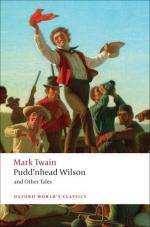As regards that time that George Washington told the truth, a word must be said, of course. It is the principal jewel in the crown of America, and it is but natural that we should work it for all it is worth, as Milton says in his ‘Lay of the Last Minstrel.’ It was a timely and judicious truth, and I should have told it myself in the circumstances. But I should have stopped there. It was a stately truth, a lofty truth —a Tower; and I think it was a mistake to go on and distract attention from its sublimity by building another Tower alongside of it fourteen times as high. I refer to his remark that he ‘could not lie.’ I should have fed that to the marines; or left it to Carlyle; it is just in his style. It would have taken a medal at any European fair, and would have got an honourable mention even at Chicago if it had been saved up. But let it pass; the Father of his Country was excited. I have been in those circumstances, and I recollect.
With the truth he told I have no objection to offer, as already indicated. I think it was not premeditated but an inspiration. With his fine military mind, he had probably arranged to let his brother Edward in for the cherry tree results, but by an inspiration he saw his opportunity in time and took advantage of it. By telling the truth he could astonish his father; his father would tell the neighbours; the neighbours would spread it; it would travel to all firesides; in the end it would make him President, and not only that, but First President. He was a far-seeing boy and would be likely to think of these things. Therefore, to my mind, he stands justified for what he did. But not for the other Tower; it was a mistake. Still, I don’t know about that; upon reflection I think perhaps it wasn’t. For indeed it is that Tower that makes the other one live. If he hadn’t said ‘I cannot tell a lie’ there would have been no convulsion. That was the earthquake that rocked the planet. That is the kind of statement that lives for ever, and a fact barnacled to it has a good chance to share its immortality.
To sum up, on the whole I am satisfied with things the way they are. There is a prejudice against the spoken lie, but none against any other, and by examination and mathematical computation I find that the proportion of the spoken lie to the other varieties is as 1 to 22,894. Therefore the spoken lie is of no consequence, and it is not worth while to go around fussing about it and trying to make believe that it is an important matter. The silent colossal National Lie that is the support and confederate of all the tyrannies and shams and inequalities and unfairnesses that afflict the peoples—that is the one to throw bricks and sermons at. But let us be judicious and let somebody else begin.




